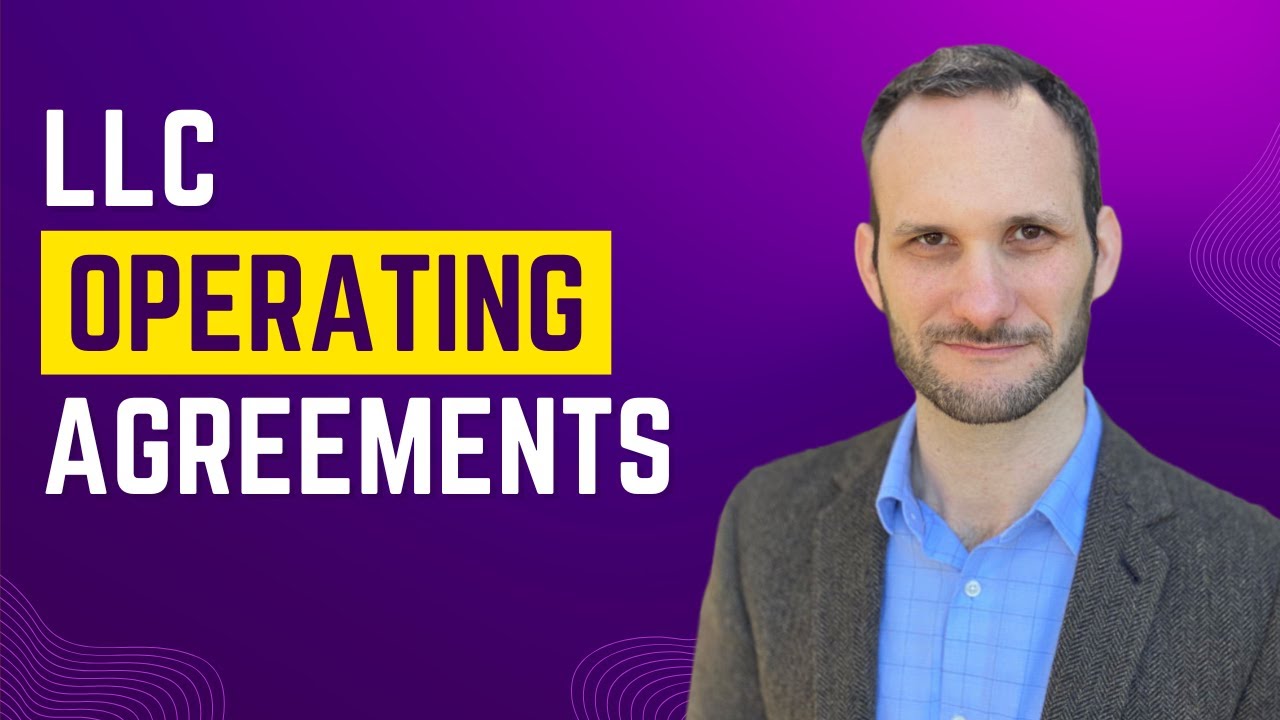Florida LLC Operating Agreement Guide
What Is an LLC Operating Agreement in Florida?
A Florida LLC operating agreement is a legal document that outlines how the company will be managed and how ownership rights are divided among members. It serves as the internal rulebook for the LLC. Although not required by law, every Florida LLC should have one.
How Does an Operating Agreement Work?
An operating agreement is a contract between the members of an LLC. It defines each member’s rights, duties, and share of profits. It also explains what happens if a member leaves, dies, or wants to sell their interest. Without an operating agreement, disputes are governed by default rules in Florida’s LLC Act, which may not reflect what the members intended.
Do You Need an Operating Agreement in Florida?
Florida law does not require LLCs to have an operating agreement. But without one, the company is exposed to uncertainty. The operating agreement can protect the LLC’s limited liability status, avoid internal disputes, and help prove the separation between the LLC and its members.
LLC operating agreements offer several key protections:
- Liability Protection: Reinforces the legal separation between you and the business.
- Creditor Protection: Helps maintain charging order protection by clarifying ownership and control.
- Dispute Avoidance: Reduces the risk of future legal fights between members.
- Estate Planning: Can control what happens to a membership interest after death or incapacity.
Without a written agreement, courts may assume all members have equal ownership and voting rights, even if one person contributed all the money.
What Should Be in a Florida LLC Operating Agreement?
A Florida LLC operating agreement should include:
- Ownership percentages
- Voting rights and management structure
- Member contributions and distributions
- Rules for meetings and decision-making
- Buy-sell provisions for member exits
- Restrictions on transferring membership interests
- Dissolution procedures
The agreement should also state whether the LLC is managed by members or by a designated manager.
A well-drafted agreement can also include asset protection provisions.
We help protect what you’ve earned.
Jon Alper and Gideon Alper are nationally recognized experts in asset protection planning and implementation. In over 30 years, we have advised thousands of clients about how to protect their assets from judgment creditors.
We provide all services remotely by phone or Zoom.

Oral LLC Operating Agreements
An LLC operating does not have to be written in Florida. The Florida statutes expressly state that an operating agreement may be, in full or in part, an oral agreement or an agreement implied by conduct.
Oral operating agreements save time and legal costs, but an oral agreement can lead to misunderstandings and conflicts between members because members have different recollections of prior oral promises.
Do Florida LLC Operating Agreements Have to be Filed?
An LLC operating agreement is a private contract among the LLC members. Florida law does not require an LLC to file with the State or to record in public records a copy of the LLC operating agreement. The general public cannot search or view each LLC’s operating agreement.
However, during litigation involving the LLC or its individual members, a court may compel discovery of the LLC operating agreement.
Benefits of a Professionally Drafted LLC Operating Agreement
Most serious businesses with significant capitalization need something more than a free or inexpensive operating agreement to express the participating members’ business relationship. Customized operating agreements are appropriate whenever the members are unrelated partners or when the members are investing significant amounts of money and expect to grow the LLC into a substantially profitable business operation.
In-depth operating agreements are also strongly recommended when any LLC member faces creditor or judgment issues to take advantage of customized asset protection provisions.
LLC members—especially unrelated business partners—may wish to discuss the following list of questions, among others, as they start a new business. Their agreed answers to these questions should be included in the Florida LLC operating agreement.
- How much money is each member expected to contribute at the start of operations?
- Which members will contribute additional money if the LLC manager makes a call for additional capital, and what are the consequences for a member does not contribute what he owes to the LLC?
- Are any members required to contribute services in consideration for their right to LLC profits?
- Are any members agreeing to guarantee LLC debt, and if so, how are these members compensated for this risk?
- Who decides whether the LLC can afford to distribute cash flow to the members?
- Are any members entitled to priority return of capital or a priority share of profits until they receive the return of all or a percentage of their initial investment?
- Do members agree to non-compete and confidentiality provisions?
- If one of the members wants to retire from the LLC business, is the LLC or are the remaining members required to pay the retiring member for his LLC interest? If so, what is the value of the retiring member’s interest?
- What happens if one of the members can no longer work in the LLC business or contribute additional money because of the member’s death or physical disability?
- What are the consequences of a particular member being involved in a divorce or other type of legal proceeding where a court may issue an order affecting that member’s rights and financial interest in the LLC?
The above list is only a sample representation of the legal and financial issues people should consider when they start a new business.
It is easier for LLC members to resolve these issues before starting their LLC business than to fight over the issues as they come up in the course of an already busy and profitable business.
How to Use an LLC Operating Agreement for Asset Protection in Florida
An LLC can be an effective asset protection tool in Florida in two ways: (1) protection from claims against the LLC and (2) protection from claims against the LLC member.
Claims Against the LLC
First, the LLC shields its members from individual liability from claims made against the LLC. A claimant can recover judgments against the LLC only from LLC assets rather than from the personal assets of individual members. People with multiple investment assets should have each asset owned by a separate LLC to isolate each LLC’s exposure to only the affected LLC’s own assets.
There are exceptions to this legal shield. One exception is when a member personally guarantees an LLC obligation. The creditor may sue the owner individually based on the guaranty, whether or not the creditor sues the LLC. Another exception is when an LLC is established to defraud creditors. The affected creditor may pursue an action to pierce the LLC liability shield.
Claims Against the LLC Member
The primary asset protection purpose of an LLC is the protection of a member’s LLC interest from the member’s individual creditors.
While a judgment creditor can levy upon and force the sale of a debtor’s stock interest in a corporation, the same creditor is limited by Florida law to a charging lien against the debtor member’s interests in LLC distributions, if any are made.
The extent to which an LLC actually protects a member’s LLC interest from his individual creditors depends significantly upon the terms and conditions of the Florida LLC operating agreement.
To best protect the LLC membership interests from creditors, an LLC operating agreement in Florida should include at minimum the following features:
- Distributions of LLC cash flow should not be required at regular intervals.
- The LLC should be permitted to make unequal distributions among members.
- In kind distributions of property should be permitted.
- Members should not be entitled to a return of their capital contributions.
- Tenants by entireties ownership of membership interests should be expressly permitted.
- Judgment creditors with charging liens should be held liable for capital contributions.
- The LLC should be permitted to loan money to members.
- The LLC should be allowed to pay management fees and other compensation to members for services to the LLC.
- The LLC should deny voting rights to involuntary transferees.
- The LLC operating agreement should expressly provide that the holder of a charging lien is liable for member’s tax liability.
The above legal concepts are not included in a typical simple form LLC operating agreement in Florida. But all of these features, and others, are important for effective asset protection of an investment through a Florida LLC.
How to Create an LLC Operating Agreement in Florida
If the LLC is owned by only one person, then an operating agreement may be helpful or provide much benefit. In special circumstances, an operating agreement can be helpful even for single-member LLCs to provide evidence as to the owner of the LLC.
For multi-member LLCs, owners can create an LLC operating agreement by:
- Using a free form.
- Paying for an agreement generated online at a low cost.
- Hiring an attorney to draft a custom operating agreement.
An attorney-drafted operating agreement will be the most expensive option. However, these operating agreements can be particularly helpful for business owners facing creditor issues or for businesses owned among non-family members (friends or business partners).
FAQs about LLC Operating Agreements
Below are answers to some common questions about Florida LLC operating agreements.
Does a Florida LLC need an operating agreement?
No, Florida law does not require an LLC to have an operating agreement. Instead, the LLC must have an Articles of Organization, which is a simple document using a form provided by the Division of Corporations.
Still, for most business owners an operating agreement provides clarity and asset protection.
Can you write your own operating agreement for your LLC?
A person is not legally required to have an attorney draft an operating agreement. However, an operating agreement is a legally enforceable document. Improper drafting could lead to issues down the road. Sometimes, it can make asset protection worse off than before.
Does an LLC operating agreement need to be notarized in Florida?
An operating agreement does not need to be notarized in Florida. However, sometimes notarization can be helpful if needing to prove that the operating agreement existed on a certain date.
What happens if an LLC has no operating agreement?
An LLC without an operating agreement functions according to the default set of rules established by Florida statutes.
Can a Florida LLC operating agreement limit a creditor’s rights?
Yes. Certain provisions—like charging order protections and limitations on voting or distributions—can restrict what a judgment creditor can do if they try to collect against a member’s interest in the LLC.
Should spouses who co-own an LLC have a written agreement?
Yes. Even between spouses, a written agreement should define how the LLC is owned and managed. It can also clarify whether the interest is held jointly in a way that provides protection from individual creditors.
Can I change my LLC operating agreement after it’s signed?
Most operating agreements allow amendments if all members agree. For single-member LLCs, the owner can usually make changes at any time, though it’s important to document the revisions formally.
Sign up for the latest information.
Get regular updates from our blog, where we discuss asset protection techniques and answer common questions.










